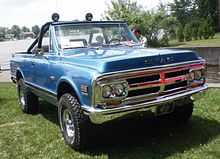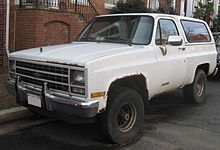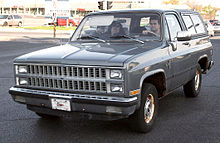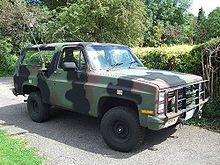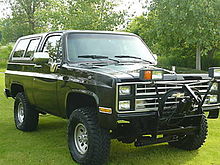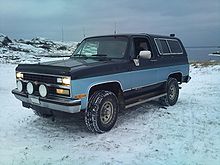- Chevrolet K5 Blazer
-
See also Chevrolet Blazer (disambiguation)
Chevrolet K5 Blazer 
Manufacturer General Motors Production 1969–1994 (North America)
1995-2001 (Brazil and Argentina)Assembly Janesville, Wisconsin, Flint, Michigan, United States Successor Chevrolet Tahoe
GMC YukonClass Full-size SUV Body style 2-door Station Wagon (North America)
4-door Station Wagon (Brazil and Argentina)Layout Front engine, rear-wheel drive / four-wheel drive Related Chevrolet C/K
GMC YukonThe K5 Blazer was the smallest full size SUV version of the General Motors C/K Trucks family. Introduced to the Chevrolet line in 1969, the full-size Blazer was replaced in 1995 by the Chevrolet Tahoe. In 1970, GMC introduced its own model of the truck, called the Jimmy, which lasted until the 1992 GMC Yukon. Both were based on the short wheelbase trucks and were available with either rear-wheel drive or four-wheel drive. The Blazer's long wheelbase relative (with an integrated rear body, and doors for 2nd row passengers) is known as the Chevrolet Suburban.
The K5 Blazer and Jimmy had "full convertible" removable tops until 1975. In 1976, GM introduced a half-cab design that was less prone to leaks and slightly safer in a roll-over. These half cabs are convertible starting at a few inches behind the driver/passenger doors all the way back to the tailgate. In 1992, the Blazer was redesigned completely and no longer had a removable top.
Smaller models, the S-10 Blazer and S-15 Jimmy, were introduced alongside these trucks in 1983. The original Blazer and Jimmy remained in production until 1991; 1992 saw the introduction of a new K1500 Blazer (and the rebadged GMC Yukon) on the GMT400 platform. After 1994, the Blazer was renamed the Chevrolet Tahoe and it was offered in a two-door model up until 1999. After that it was offered only with four passenger doors.
Contents
1969–1972
First generation 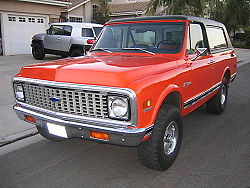
Also called GMC K5 Jimmy Model years 1969–1972 Body style 2-door SUV Engine 250 cu in (4.1 L) I6
292 cu in (4.8 L) I6
307 cu in (5.0 L) V8
350 cu in (5.7 L) V8Transmission 3-speed TH-350 automatic
3-speed manual
4-speed manualWheelbase 104 in (2,642 mm) [1] Length 177.5 in (4,509 mm) [1]
180"(1971)[2]Width 79 in (2,007 mm) [1] The original K5 was a short wheelbase truck. It was available in 1969 as 4-wheel drive only; in 1970, a two-wheel-drive model was offered. There were four choices for power plants: the 250 in straight-6, the 292 straight-6, the 307 V8, and the 350 V8.
The Blazer was designed and marketed to compete with International Harvester Scout and the Ford Bronco. Both of these were originally aimed at the short Jeep CJ series, which were much smaller than other trucks. The great innovation of the Blazer was to simply offer a shortened pickup truck, which both increased interior space, and lowered the cost of production with a shared platform. The Blazer quickly became popular. For the first time, it married the off-road capabilities of the Scout with the "luxury" features like air conditioning and automatic transmissions routinely available on pickup trucks. By 1970, the Blazer was already outselling both of its older rivals. Ford, Dodge, and even Jeep would counter with similar shortened pickups, with the Dodge Ramcharger and Jeep Cherokee. It also came as a convertible.[3]
The two-wheel drive version came with independent front suspension and rear trailing arms, both with coil springs. The four-wheel drive version had a solid front axle and used leaf springs front and rear. Both versions used drum brakes at all four corners until 1971, when the entire GM light truck line got standard front discs. A tachometer was optional.[4]
There was also a choice between a three-speed automatic transmission Turbo Hydromatic (TH350), a three-speed manual transmission, and a four-speed Synchromesh (SM465) manual transmission. Two transfer cases were offered: the Dana 20, available only with the manual transmissions, or the NP-203, available with both types of transmissions. The Blazer had 8 inches (200 mm) of ground clearance and an approach angle of 35°.[1]
Engines:- 250 in³ (4.1 L) I6 (1969–1984)
- 292 in³ (4.8 L) I6 (1970–1971)
- 307 in³ (5.0 L) V8 (1969–1973)
- 350 in³ (5.7 L) V8 (1969–1991)
Transfer cases:
- NP-205 - gear driven part-time four wheel drive
- Dana 20 - gear driven part-time four-wheel drive
Production Totals:1969 - 4,935
1970 - 11,527
1971 - 17,220
1972 - 44,266
1973–1991
Second generation 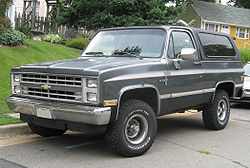
Also called GMC Jimmy, Full size Blazer Model years 1973–1991 Engine 250 cu in (4.1 L) I6
292 cu in (4.8 L) I6
305 cu in (5.0 L) V8
307 cu in (5.0 L) V8
350 cu in (5.7 L) V8
400 cu in (6.6 L) V8
6.2 L Detroit Diesel V8Transmission 4-speed SM465 manual
3-speed TH-350 automatic
3-speed TH-400 automatic
4-speed 700-R4 automaticWheelbase 106.5 in (2,705 mm) Length 184.8 in (4,694 mm)[5] Width 79.6 in (2,022 mm) Height 73.8 in (1,875 mm) In 1973, GM's line of full-size trucks was redesigned and updated. A tilt-steering wheel became optional.[6] Although rear-wheel drive Blazers were manufactured until 1982, the majority sold were four-wheel drive.
Until 1975, the K5 had a removable convertible top. In 1976, a half-cab design was introduced and used until 1991.[7][8]
Although the GMT400 platform was introduced in the spring of 1987 as a 1988 model, the K5 Blazer, Suburban, and crew-cab trucks retained the earlier platform until 1991. In 1989, the front grille was changed to resemble the squared-off ones used on the GMT400 series of pickups.
The K5 Blazer is very popular in the off-roading scene. It is a strong truck with the 350 V8 (which was the optional power plant), the gear driven NP-205 and 10- and 12-bolt axles. It is very easy to upgrade this engine, because there are many companies with performance parts available. Later models produced after 1980 used the chain-driven NP208 transfer case, and the NP241 after 1988.
The second generation K5 models incorporated the rear hatch glass and tailgate into a single unit, which allowed the glass panel to retract inside of the tailgate by use of a manual crank mounted on the tailgate or an electric motor activated by a key-operated switch on the tailgate and a dash-mounted switch. The weight of the large glass panel proved to be a liability, as the manual crank gears wore prematurely, and the electric motor was prone to frequent overheating and subsequent failure. Another issue with the tailgate/rear hatch design of the K5 Blazer was the safety switch, which prevented the rear window from being raised if the tailgate was lowered. The third generation model returned to the separate glass hatch/tailgate design that was originally in the first generation model. In 1976, the Delco Freedom battery became an option.[9]
Since 1981 (in the wake of the 1973 Arab Oil Embargo and the 1979 energy crisis), Chevrolet and GMC used the smaller displacement 305s with a 9.2:1 compression ratio. These engines produced nearly as much torque as the 350, giving a similar driving feel. However, these power plants were underpowered and prone to detonation (engine knocking), especially with the electronic spark control module. To achieve the 9.2:1 compression ratio, the cylinder head chambers were smaller, measuring 54 cc instead of 60 cc. Despite a camshaft swap, some Blazer owners swapped out the 305s in favor of 350s, since the smaller displacement power plant was used in all Chevrolet/GMC pickups and passenger cars. 1982 saw the Detroit Diesel 6.2 introduced.
Around 1981, a prototype K5 Blazer was used as a testbed for a military CUCV vehicle. Between 1983 and 1987, what is known as the M1009 CUCV was the production militarized version of the civilian K5. The differences are the lack of an air conditioner, an additional leaf spring in the suspension, a hybrid 12/24 V electrical system (described in detail below), blackout headlights, a rifle rack, and special paint jobs. A majority of them are painted olive drab green or in the woodland camouflage pattern, though some vehicles that saw desert use were painted tan. All M1009s, including its derivatives, are powered with the 6.2 L Diesel power plant.
The M1009s have a split 24/12 V electrical system. Most of the truck actually runs on 12 V. It has two separate 12 V alternators and batteries wired in series, only the glow plug system, the starter, and the jumper cable jack are wired to the 24 V terminals. everything else in the truck runs on 12 V. The glow plugs are actually 12 V glow plugs with a resistor pack on the firewall to drop the 24 V down to 12 V. This resistor pack can be bypassed and the glow plugs run directly off of the 12 V battery. If this is done and the 24 V starter is replaced with a standard 12v starter the second alternator and battery are no longer needed. (If this is done then the military 24 V slave adapter in the grille will need to be disconnected as well.)
Some decommissioned M1009s end up in law enforcement use (e.g. with the Los Angeles County Sheriff's Department) or sold through government auctions, but a handful are still in use by the National Guard.
After 1987, when throttle-body injection was introduced in the truck engines, the 350 was made the standard power plant.
GM temporarily changed the usual "C/K" designation to "R" and "V" for the 1987 through 1991 model years. This was done to avoid confusion with the GMT400-based Chevrolet C/K pickup trucks, which were introduced in 1988, during the overlap period.
In 1988, four new colors were introduced: Bright Blue Metallic, Forest Green Metallic, Light Mesa Brown Metallic, and Dark Mesa Brown Metallic. More new features for 1988 included a fixed mast antenna in place of the old windshield antenna, a trip odometer as part of the gauge package cluster, and an improved pulse windshield wiper control. Also, helping to reduce air leaks in the doors was a new door handle seal.
The 1989 Blazer had new base and up-level grilles, as well as new headlight bezels, body side moldings, and bumper rub strips. Corporate 10-bolt axles were upgraded to 30 spline axle shafts from previous 28 spline. New for 1989 was the introduction of an all-new base coat/clear coat paint. The standard L05 5.7-liter V-8 now had serpentine accessory drive belts in place of the older multi-belt accessory drive.
For the 1990 model year, all Blazers now had a standard rear wheel anti-lock braking system. A new electronic speedometer system, with a 6 digit odometer on the dashboard was also introduced for 1990, along with non-asbestos brake linings. A new brake warning light on the dashboard was also introduced for 1990. The Blazer body also used double sided, galvanized exterior sheet metal. A new option for 1990 was power mirrors. The 5.7-liter V-8 (L05) engine was improved for 1990 with the addition of improved oil control rings, a redesigned rear crankshaft seal, a new camshaft sprocket design, non-asbestos intake manifold gaskets, and heavy-duty intake valves.
And for 1991, the 700R4 was renamed to 4L60. The TBI (throttle body injection) system used on the Blazer's standard 5.7-liter V-8 had longer throttle shaft bearings, new throttle return springs, and improved fuel mixture distribution. The 5.7-liter V-8 also had new heavy-duty intake valves and powdered metal camshaft sprockets. Standard on all engines was a lighter more powerful 100-amp CS130 alternator. Two new exterior colors, Brilliant Blue and Slate Metallic were offered.
Engines:- 250 in³ (4.1 L)
HP: 105 TQ: 185 (1973-1978) HP: 130 TQ: 210 (1979-1984)
- 305 in³ (5.0 L) V8
HP: 160 TQ: 235 (Non-CA model)(1981-1986) HP: 155 TQ: 240 (CA model) (1981-1986) 2BBL HP: 130 TQ: 240 (1981) TBI HP: 170 TQ: 260 (1987)
- 307 in³ (5.0 L) V8
HP: 130 TQ: 220 (Non-CA model)(1973)
- 350 in³ (5.7 L) V8
HP: 175 TQ: 275 (1973-1986) HP: 160 TQ: 260 (1981-1986) TBI HP: 210 TQ: 300 (1987)
- 400 in³ (6.6 L) V8
HP: 185 TQ: 300 (1975-1980)
- 6.2 L Detroit Diesel (379 in³) V8
HP: 135 TQ: 240 (1982-1987)
(All HP and TQ numbers are pulled from GM factory service manual)
Transmissions:
- Turbo Hydromatic TH-350 three-speed automatic (1973–1981)
- Turbo Hydromatic TH-400 three-speed automatic (1974–1979)
- 700R4 (4L60) four-speed overdrive automatic (1982–1991)
- Saginaw SM465 four-speed manual (1973–1991)
Transfer cases:
- Dana 20 - gear driven part-time four wheel drive (1973) (noted at novak-adapt.com- They were much less common than the NP205 and NP203. We have seen one Dana 20 in a Chevrolet truck with the TH400, but there is no documentation to support this being a factory combination.)
- NP-205 - gear driven part-time four wheel drive (1973–1980)
- NP-203 - chain driven full-time four wheel drive (1973–1979)
- NP-208 - chain driven part-time four wheel drive (1981–1988)
- NP-241 - chain driven part-time four wheel drive (1988–1991)
- (NP-208 & NP-241 are "shift-on-the-fly")
Axles:
- Dana 44 - Front axle (1973-1977/78)
- GM Corporate 10 Bolt - Front axle (1977/78-1991)
- GM Corporate 12 Bolt - Rear axle (1973–1981)
- GM Corporate 10 Bolt - Rear axle (1982–1991)
Production Totals:1973 - 44,841
1974 - 56,798
1975 - 50,548
1976 - 74,389
1977 - 86,838
1978 - 88,858
1979 - 90,987
1980 - 31,776
1981 - 23,635
1982 - 24,514
1983 - 26,245
1984 - 39,329
1985 - 40,011
1986 - 37,310
1987 - 32,437
1988 - 28,446
1989 - 26,663
1990 - 18,921
1991 - 7,332
1992–1994 (1995-2001)
Third generation 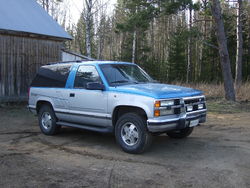
Also called GMC Yukon
Chevrolet Silverado (Mexico)
Chevrolet Grand Blazer (Brazil and Argentina)Model years 1992–1994 (United States)
1995-2001 (Brazil and Argentina)Platform GMT415 Engine 350 in³ (5.7 L) L05 V8
395 in³ (6.5 L) Detroit Diesel V8Transmission 4-speed 700-R4 (4L60) automatic
4-speed 4L60E automatic
5-speed manualWheelbase 111.5 in (2,832 mm)[10] Length 1994: 187.7 in (4,768 mm)
1992–93: 188.0 in (4,775 mm)Width 1994: 76.4 in (1,941 mm)
1992–93: 77.1 in (1,958 mm)Height 1994: 71 in (1,803 mm)
1992–93: 71.0 in (1,803 mm)The full-size Chevrolet Blazer was updated in 1992 on the new GMT400 platform and lasted through the 1994 model year. The GMC Jimmy moniker was dropped from the full-size SUVs for 1992, replaced by the GMC Yukon nameplate was introduced that year. The Blazer platform was known as GMT415, and the Yukon was GMT430. In Mexico, this model is called the Silverado (not to be confused with the 1999-present full-size pickup truck).
The models were mostly identical to each other save for emblems and identification, grilles, and some trim packages; Cheyenne and Silverado for Chevy, SL and SLE for GMC. A Blazer Sport was offered with a flat graphite color applied to the lower areas of the vehicle and fender flares. A GMC Yukon GT was offered in a two-tone paint scheme early on with fender flares, it was then changed to a monochromatic appearance package later on.
These trucks had a slightly longer wheelbase than the previous models to improve drivability and towing, but there was no removable top offered, with a hatch and tailgate in the rear. Darker tinted glass was used for the rear hatches. Most were equipped with roof racks. The new frame was strengthened and an independent front suspension design was used. The 350 throttle-body injected V8 L05 was carried over from the 1991 models as well as 700-R4 (4L60) transmission. In 1993, an electronically-controlled 4L60-E transmission was introduced. In 1994, the grille shell was updated and an LED third brake light added. A 6.5 liter turbo diesel was offered as well. They had a breakover angle of 29°.[10]
In 1995, the full-size Blazer was redesignated as the Chevy Tahoe to be sold along with its new 4-door "shortened Suburban" counterpart, and the interior was redesigned with a new dashboard, seats, and door panels. The Yukon received the same treatment. In 1996, a new Vortec 5.7 liter 350 V8 was introduced to replace the old 350 throttle body injection engine, along with OBD-II diagnostics.
A Z71 off-road suspension RPO was offered on these trucks from 1992-1999 which consisted of larger 265/75/R16 tires, Bilstein shocks, skid plates, and some other beefed up items, just like the pickups had. Contrary to common belief, no 2-door Blazer, Yukon, or Tahoe ever left the factory with a Z71 decal on the side.
The 2-door Tahoe was in production up until 1999, the last model year for this 2-door SUV. The 2-door GMC Yukon on the GMT400 platform was produced until 1997.
References
- ^ a b c d "Directory Index: GM Trucks and Vans/1969_Trucks_and_Vans/1969_Chevrolet_Blazer_Brochure". Oldcarbrochures.com. http://www.oldcarbrochures.com/static/NA/GM%20Trucks%20and%20Vans/1969_Trucks_and_Vans/1969_Chevrolet_Blazer_Brochure/1969%20Chevrolet%20Blazer-06.html. Retrieved 2011-11-20.
- ^ "Directory Index: GM Trucks and Vans/1971_Trucks-Vans/1971_Chevrolet_Blazer_Brochure". Oldcarbrochures.com. http://www.oldcarbrochures.com/static/NA/GM%20Trucks%20and%20Vans/1971_Trucks-Vans/1971_Chevrolet_Blazer_Brochure/1971%20Chevy%20Blazer-08.html. Retrieved 2011-11-20.
- ^ "Directory Index: GM Trucks and Vans/1969_Trucks_and_Vans/1969_Chevrolet_Blazer_Convertible_Top". Oldcarbrochures.com. http://www.oldcarbrochures.com/static/NA/GM%20Trucks%20and%20Vans/1969_Trucks_and_Vans/1969_Chevrolet_Blazer_Convertible_Top/1969%20Chevy%20Blazer%20Convertible%20Top-01.html. Retrieved 2011-11-20.
- ^ "Directory Index: GM Trucks and Vans/1971_Trucks-Vans/1971_Chevrolet_Blazer_Brochure". Oldcarbrochures.com. http://www.oldcarbrochures.com/static/NA/GM%20Trucks%20and%20Vans/1971_Trucks-Vans/1971_Chevrolet_Blazer_Brochure/1971%20Chevy%20Blazer-06.html. Retrieved 2011-11-20.
- ^ "Directory Index: GM Trucks and Vans/1973_Trucks_and_Vans/1973_Chevrolet_Blazer_Brochure". Oldcarbrochures.com. http://www.oldcarbrochures.com/static/NA/GM%20Trucks%20and%20Vans/1973_Trucks_and_Vans/1973_Chevrolet_Blazer_Brochure/1973%20Chevrolet%20Blazer-08.html. Retrieved 2011-11-20.
- ^ "Directory Index: GM Trucks and Vans/1973_Trucks_and_Vans/1973_Chevrolet_Blazer_Brochure". Oldcarbrochures.com. http://www.oldcarbrochures.com/static/NA/GM%20Trucks%20and%20Vans/1973_Trucks_and_Vans/1973_Chevrolet_Blazer_Brochure/1973%20Chevrolet%20Blazer-07.html. Retrieved 2011-11-20.
- ^ "Chevy Blazer specifications". ColoradoK5.com. Performance Media Group, Inc. http://coloradok5.com/specs.shtml#1976. Retrieved 2009-10-05.
- ^ Blazer '76 catalog, Chevrolet Motor Division, September 1975, p. 4, http://www.coloradok5.com/brochures/1976/blazer4.jpg
- ^ "Directory Index: GM Trucks and Vans/1976_Trucks_and_Vans/1976_Chevrolet_Blazer_Brochure". Oldcarbrochures.com. http://www.oldcarbrochures.com/static/NA/GM%20Trucks%20and%20Vans/1976_Trucks_and_Vans/1976_Chevrolet_Blazer_Brochure/1976%20Chevy%20Blazer-06.html. Retrieved 2011-11-20.
- ^ a b DeLong, Brad. 4-wheel Freedom. Paladin Press. ISBN 0-87364-891-9.
External links
Type 1950s 1960s 1970s 0 1 2 3 4 5 6 7 8 9 0 1 2 3 4 5 6 7 8 9 0 1 2 3 4 5 6 7 8 9 SUV K5 Blazer K5 Blazer Suburban Suburban Suburban Suburban Suburban Pickup LUV Advance Design Task Force C/K C/K C/K El Camino El Camino El Camino El Camino El Camino Van Van Van Beauville « previous – Chevrolet, a division of General Motors, light truck timeline, United States market, 1980s–present Type 1980s 1990s 2000s 2010s 0 1 2 3 4 5 6 7 8 9 0 1 2 3 4 5 6 7 8 9 0 1 2 3 4 5 6 7 8 9 0 1 2 Compact crossover Mid-size crossover Equinox Equinox Full-size crossover Traverse Mini SUV Tracker Tracker Compact SUV S-10 Blazer Mid-size SUV Blazer TrailBlazer Full-size SUV K5 Blazer Blazer Tahoe Tahoe Tahoe Suburban Suburban Suburban Suburban SUT Avalanche Avalanche Coupe utility El Camino SSR Compact pickup LUV S-10 S-10 Mid-size pickup Colorado Full-size pickup C/K C/K Silverado Silverado Minivan Lumina APV Venture Uplander Van Astro Astro Van Express Beauville GMC, a division of General Motors, light truck timeline, United States market, 1980s–present Type 1980s 1990s 2000s 2010s 0 1 2 3 4 5 6 7 8 9 0 1 2 3 4 5 6 7 8 9 0 1 2 3 4 5 6 7 8 9 0 1 2 Mid-size crossover Terrain Full-size crossover Acadia Mid-size SUV S-15 Jimmy Jimmy Envoy Typhoon Full-size SUV K5 Jimmy Yukon Yukon Yukon Suburban Suburban Yukon XL Yukon XL Coupé utility Caballero Compact pickup S-15 Sonoma Sonoma Syclone Mid-size pickup Canyon Full-size pickup C/K Sierra Sierra Sierra Van Safari Safari G-Series Savana Categories:- All wheel drive vehicles
- Chevrolet vehicles
- Rear wheel drive vehicles
- SUVs
- 1960s automobiles
- 1970s automobiles
- 1980s automobiles
- 1990s automobiles
- Vehicles introduced in 1969
- Motor vehicles manufactured in the United States
Wikimedia Foundation. 2010.

